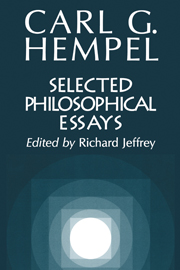Book contents
- Frontmatter
- Contents
- Preface
- Dates
- Introduction
- TRUTH
- PROBABILITY
- METHODOLOGY
- MEMOIRS
- Chapter 13 Rudolf Carnap: Logical Empiricist
- Chapter 14 The Vienna Circle and the Metamorphoses of Its Empiricism
- Chapter 15 Hans Reichenbach Remembered
- Chapter 16 Empiricism in the Vienna Circle and in the Berlin Society for Scientific Philosophy: Recollections and Reflections
- C. G. HEMPEL'S PUBLICATIONS
- Index
Chapter 16 - Empiricism in the Vienna Circle and in the Berlin Society for Scientific Philosophy: Recollections and Reflections
Published online by Cambridge University Press: 05 June 2012
- Frontmatter
- Contents
- Preface
- Dates
- Introduction
- TRUTH
- PROBABILITY
- METHODOLOGY
- MEMOIRS
- Chapter 13 Rudolf Carnap: Logical Empiricist
- Chapter 14 The Vienna Circle and the Metamorphoses of Its Empiricism
- Chapter 15 Hans Reichenbach Remembered
- Chapter 16 Empiricism in the Vienna Circle and in the Berlin Society for Scientific Philosophy: Recollections and Reflections
- C. G. HEMPEL'S PUBLICATIONS
- Index
Summary
INTRODUCTORY REMARKS ON THE TWO EMPIRICIST GROUPS
The central ideas of logical, or scientific, empiricism as it developed during the twenties and early thirties in Vienna and in Berlin grew out of collaborative efforts of scientifically interested philosophers and philosophically interested scientists. Those thinkers noted that while the claims made by the physical sciences were amenable to objective test by experiment and observation, the pronouncements put forward by metaphysics were incapable of any such objective critical appraisal. And while hypotheses advanced in the physical sciences would eventually be accepted or rejected and thus lead to the growth of a body of objective scientific knowledge, the problems and pronouncements of metaphysics, inaccessible to objective appraisal, kept reappearing over and over again.
Moritz Schlick, the founding father of the Vienna Circle, addressed this situation in an article entitled “Die Wende der Philosophie,” which appeared in 1930 in the first issue of the empiricist periodical Erkenntnis. Rejecting “the anarchy of philo-sophical opinions,” he solemnly declared, “We stand in the middle of a definitive turn of philosophy and are justified in regarding the fruitless strife of philosophical opinions as finished.” The means for avoiding all such fruitless strife he saw in the clear and precise thinking exemplified by the exact sciences and informed by the principles of exact formal, or symbolic, logic.
Broadly speaking, the Vienna Circle held that the purported problems of metaphysics constitute no genuine problems at all and that in an inquiry making use of an appropriately precise conceptual and linguistic apparatus, metaphysical questions could not even be formulated.
- Type
- Chapter
- Information
- Selected Philosophical Essays , pp. 295 - 304Publisher: Cambridge University PressPrint publication year: 2000

